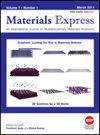Pachyman alleviates cognitive impairment after sevoflurane anesthesia in gastric cancer surgery
IF 0.7
4区 材料科学
Q3 Materials Science
引用次数: 0
Abstract
Cancer cell metastasis has already taken place in most of the gastric cancer (GC) patients when diagnosed. Despite that surgery effectively delays the development of GC, sevoflurane anesthetic during surgery tends to cause cognitive impairment. Previous studies have depicted anti-tumor and neuroprotective effects of pachyman. Therefore, this study aimed at investigating a potential mechanism whereby pachyman alleviates cognitive impairment after sevoflurane anesthesia in GC surgery. A rat model of GC was constructed and received treatment with pachyman at different concentrations and caspase-3 inhibitor and agonist. After treatment, the level of inflammatory factors was detected by ELISA. Flow cytometer and Morris water maze were conducted to assess cell death and cognitive function, followed by HE gastric histopathological staining. In addition, RT-qPCR and Western blot detected GSH-PX and caspase-3 expression. Pachyman positively induced the apoptosis of GC cells and strengthened the cognitive function of rats with downregulated caspase-3. Moreover, caspase-3 inhibitor also accelerated apoptosis and improved rat cognitive function. When caspase-3 was inhibited, the level of GSH-PX was elevated. Combination of pachyman and caspase-3 inhibitor more significantly induced GC cell apoptosis and alleviated cognitive impairment. Pachyman alleviates the cognitive impairment caused by sevoflurane anesthesia in GC rats and induces tumor cell apoptosis through down-regulation of caspase-3 and up-regulation of GSH-PX.Pachyman 可减轻胃癌手术七氟醚麻醉后的认知障碍
大多数胃癌(GC)患者在确诊时已发生癌细胞转移。尽管手术能有效延缓胃癌的发展,但手术过程中的七氟醚麻醉往往会导致认知障碍。以往的研究表明,帕奇曼具有抗肿瘤和保护神经的作用。因此,本研究旨在探讨茯苓甲素减轻 GC 手术中七氟醚麻醉后认知功能损害的潜在机制。研究人员构建了一个 GC 大鼠模型,并使用不同浓度的帕希曼、caspase-3 抑制剂和激动剂进行治疗。治疗后,用 ELISA 检测炎症因子的水平。用流式细胞仪和莫里斯水迷宫评估细胞死亡和认知功能,然后进行 HE 胃组织病理学染色。此外,RT-qPCR和Western blot检测了GSH-PX和caspase-3的表达。结果表明,柏西曼能积极诱导 GC 细胞凋亡,并在 caspase-3 下调的情况下增强大鼠的认知功能。此外,caspase-3 抑制剂也能加速细胞凋亡,改善大鼠的认知功能。抑制 caspase-3 时,GSH-PX 水平升高。帕奇曼和 caspase-3 抑制剂联合使用,能更明显地诱导 GC 细胞凋亡,缓解认知功能障碍。帕奇曼能缓解七氟醚麻醉对GC大鼠造成的认知障碍,并通过下调caspase-3和上调GSH-PX诱导肿瘤细胞凋亡。
本文章由计算机程序翻译,如有差异,请以英文原文为准。
求助全文
约1分钟内获得全文
求助全文
来源期刊

Materials Express
NANOSCIENCE & NANOTECHNOLOGY-MATERIALS SCIENCE, MULTIDISCIPLINARY
自引率
0.00%
发文量
69
审稿时长
>12 weeks
期刊介绍:
Information not localized
 求助内容:
求助内容: 应助结果提醒方式:
应助结果提醒方式:


